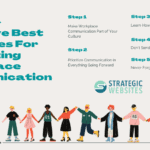Communication is often a practice that is left behind in the professional world. Especially in the busy everyday of a business. Often times, we're so excited with new ideas, or so overwhelmed with all our tasks, we don't take the time to communicate with others nor ourselves the way we should be. This is important everyday, but especially during this pandemic. Today we are talking about communicating within your business- colleagues, clients and yourself!
Communicating with Colleagues: Whether it's fear of stepping on someone's toes, or you just simply do not know how to have a functioning work relationship. We all have our battle stories. Most of which turn out with as a lesson we can take with us for next time, hopefully. So, what do you when you just don't know how to communicate with your colleague?
To start, there is no shame in asking questions such as “how should I get this information to you?”, “when would you like this by?”, “is there anything specific you would like me to know?”. It's better to ask 100 questions than 0 not ask and it lead to conflict. When in a workplace, it's natural that friction may arise between you and your colleagues. Whether it's waiting for an answer, waiting for a task to be completed, or you didn't like the way something was went about. Say something. Oftentimes what happens is we sweep things under the rug out of fear of conflict. The more you sweep, the more resentful you will become. Resentment is a nasty trade to have in the workplace, and we can guarantee it will turn into a bigger conflict than it needed to be.
When possible, pick up the phone or have a face-to-face conversation when it comes to the big stuff. Think of a time when you got into an argument with someone over the way they perceived your text. You probably didn't notice the way it came off until the person became upset with you. The same thing happens in the workplace. Communication is always better when it's not through a medium. Last and most importantly, listen and and make sure you hear what your colleagues have to say. Listening and hearing are two different things. When you hear someone, it reflects in your actions. Nothing makes some as happier than having their voice heard and valued.
Communicating with Clients: We're taught that the client is always right. Well, what happens when the client isn't always right? We're not talking strictly factually, we're talking about how they communicate. Businesses strive to not get angry messages, calls or reviews from clients, but it's unfortunately not inevitable.
So, what happens when this situation occurs? You communicate with the utmost respect and with much information you can give away as possible. If a client is upset at something, it's best to first take a breath. Getting yelled at is no fun, but you want to defuse the situation by providing a calming presence. Acknowledge they're upset, acknowledge a communication may occur, and acknowledge you will learn and grow from this. That is the best thing you can do in a situation like this. Yelling back at a client is a bad look, and will only cause more damage.
We also encourage you to always be honest with your clients. And no, we aren't encouraging you to give up information that should remain within your business or organization. We are talking about if you need to extend a deadline, if you made some sort of error or if you simply had a miscommunication. They will appreciate honesty way more than they will appreciate you ‘dancing around the bush.'
Communicating with Yourself: We know… this sounds super weird. Let us explain! Communicating with yourself means you are checking in with yourself. It means you're making sure you're not overloaded with work, it means you are being a contributing member to your work team, it means making sure you're hearing others, it means working on your and being your own advocate. The more you do this, the more you will find success in communicating with others.
When lines of communication are opened within your business or organization, you will see a major shift. Resentment either doesn't happen or it resides, work becomes less burdensome, events become easier. Communication takes constant work, but once you make it a practice, it'll come naturally, you won't even have to think about it. Get out there and communicate!





